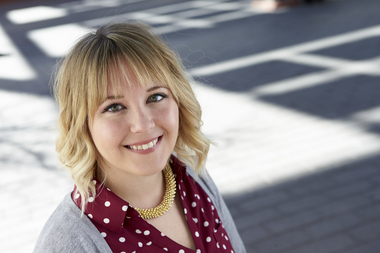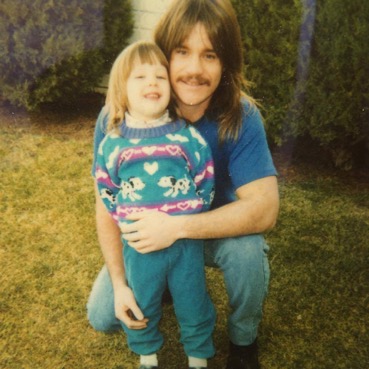Having Both Parents Incarcerated Led To a Career in Understanding and Helping Others

Julia, CEO and founder of Prison: The Hidden Sentence™, met Bree in Las Vegas a few years ago. This interview took place in Dallas at the International Prisoners’ Family Conference. Bree recently graduated from the University of Nevada – Las Vegas, and is currently a professor at Wichita State University. She’s originally from Nevada, and her childhood was not the traditional or typical story. Both of her parents had issues with substance abuse. Both of them have been incarcerated. When Bree was 11 years old, her father had his third drug related felony and was sentenced to 9 to 29 years. He ended up serving 10 years in prison, and was paroled in 2010. All through her childhood she visited him in prison. She says that this has led her to wanting to pursue higher education and help others.
Listen to the Interview:
(Minor edits for readability)

Bree: I just noticed that things just didn’t seem right having both parents incarcerated. My father didn’t have a lot of access to treatment programming while he was incarcerated. He really had to do things on his own, he was fortunate to have a family who could pay for him to pursue a college education but unfortunately that’s not the case for many prisoners across the United States. Just noticing those things and noticing how hard it is for families to maintain contact, especially in Nevada because we don’t have the best public transportation. Unless you have your own reliable way to get there it’s pretty impossible to visit your loved ones in rural parts of the state. Also, just paying the dollar per minute phone calls, getting there, having to have clothing that fits the requirements, and those requirements depend on which CO (correction officer) is working that day. It can change, which is really frustrating when you get there and then they turn you away because you’re not wearing the right thing. Or they put you in an orange jumpsuit which is kind of embarrassing.
Julia: I never heard of that, so they actually gave you something to wear so you could see your dad.
Bree: That actually happened to my aunt, too. I remember one time she was wearing the wrong thing, even though she saw the rules and I would have said she adhered to the rules. They said no, and they made her wear an orange jumpsuit because she didn’t have other clothes in the car.
Julia: I think that’s better than being turned away and not being able to see your loved one, so I think that’s really interesting. I never heard that before, so thanks for sharing that.
Bree: The only negative of that is I don’t know how often they wash those jumpsuits, so they don’t smell the best. But yeah all those little hidden things that public doesn’t know about. That’s what really drove me to want to pursue higher education. I went for my Bachelor’s Degree at University of Nevada- Reno and I got my degree in criminal justice and psychology. I really wanted to understand first of all why people start committing crimes, but more importantly how do we get them to stop. So what are the best interventions, what can we do to reduce recidivism? Because as of right now when someone goes to prison within three years on average 68% of them go back. So we have really high recidivism rates in our country, we lock up more people than any other nation in the world. We have 5% of the world’s population but 25% of the world’s prison population, which I’m sure Julia knows.
Julia: Yes, that’s what I quote, too. Have you come to any recommendations?
Bree: So based upon research we know that cognitive behavioral therapy works really well as a whole. It can reduce recidivism by up to 35%.
Julia: What does that mean for the layman?

Bree: Sure, so cognitive behavioral therapy is trying to help individuals who’ve broken the law understand how their thinking affects their behavior. So cognitive behavioral therapy isn’t just used in prison settings, it’s used in general psychology. So the underlying assumption of rehabilitation is that people who’ve broken the law have some sort of psychological or mental illness that affects their decision making. So it’s really about helping those individuals make better decisions, because a lot of them come from poor parenting backgrounds where they weren’t given the structure and love and stability that they need to make decisions that align with what society deems is law abiding behavior. So really that’s what cognitive behavioral therapy is about, is trying to help them understand how thinking affects behavior.
Julia: That’s something they could probably do in the schools?
Bree: They could, I think as a nation we do a poor job of early intervention for children. We see that the highest effect sizes, which means the highest prevalence or prevention is from those early interventions. So family programs to help the family system, so we can prevent people from even going into the system to begin with, because a lot of this stems adverse childhood experiences. That’s a lot of what I’ve devoted my research towards is understanding how those adverse childhood experiences affect people later in life. Because I know for me personally I’ve had a lot of trauma, as I’m sure everyone here at this conference and across the US has had. I never had the opportunity to address it when I was a child, so trying to give people the tools in the community that prevents those things from substantiating into criminal behavior is the way that we can prevent it from even happening.
Julia: So your findings, how do you get the word out?
Bree: I go to conferences like this, so that’s a good way. There’s also academic conferences, but I’ve also had the privilege while I was a doctoral student that I’ve been interviewed by media. So I’ve actually gotten my research out that way, which was a really cool experience. I think a part of why the media took interest in me is because of my story. I was always ashamed of that story, I didn’t want to share it with people, but it wasn’t until I went to graduate school, and I had really supportive mentors and understanding how this stuff impacts our society as a whole. It encouraged me to want to speak out more about it.
Julia: Well I think it’s good you do because you’re a role model for a lot of people, and I know that you’ve raised awareness and I know that you’re making a difference. So I want to thank you for that.
Bree: Thanks.
Julia: I’m really glad you came to the conference, this is your first year and any feedback now that it’s almost over?
Bree: Yeah, so I’ve been to a lot of academic conferences which I would say are a lot more stuffy and a lot of ego. But this conference is a lot different, I think because I can truly be myself. I can talk about stories that if I talked to a general person in the public they would be shocked. But here people just understand it, if I say something about prison I don’t have that look of shock here, which is really nice. I think building those personal bonds here is have been a really unique part of this conference that I haven’t found at other conferences. So I’ve made connections with people that I’m definitely going to take with me, and it’s not just networking with a job, it’s like emotional connections with people who’ve been through a similar experience. So it’s been awesome, if you haven’t been to this conference you definitely should because it’s just an amazing opportunity to meet other people.
Julia: Well thank you Bree, and we’ll be posting information about next year’s conference once we get it.
UPDATE: The International Prisoner’s Family Conference is scheduled for October 16-18, 2019.
Follow Bree on Twitter.

Leave a Reply